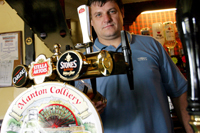John Wesley
The miner's strike, 1984 From mining John moved to Sheffield to become a steel worker. He now is the landlord of 'The Rock' pub on Rock Street in Pitsmoor. © Carl Rose John Wesley worked at Manton pit in Nottinghamshire. During the miners' strike in 1984 he joined the picket lines with other miners. This sound clip lasts for 4 minutes and 30 seconds. So I was just saying that you were a miner before you were a steelworker and you were a miner in Manton pit which is, nearish Worksop isn't it, but it's in the Nottinghamshire NUM Area, is that right? No it's in Worksop but it were in South Yorkshire NUM Area. (Okay) Like I say, Manton it were, in strike there were probably 900 and, 900 and so men and there 90 stopped out on strike, that's only ten percent of us who stopped out on strike. So we had it both ways. We'd a lot of earache from Yorkshire lads who were on strike, but we were on strike, y'know what I mean, but we still had earache, 'cos there were that many going back. But of course we couldn't do nowt about it, do you know what I mean? But we still had earache and we had earache off scabs sort of thing, who we...when it all finished in '85, we had to go back and work with. So it were hard for the 90 of us what were out, it were hard, to get your point of view across to everybody, it were even harder. People like say, what is it? 'It were so that hard it were...?' Oh I don't know, it were hard sort of thing. So you were out for a year at Manton were you? Yeah, we were out for a year. Then we had a week after strike for them who were sacked during strike (SC: Yeah) so it were like a year and a week. As I say, I know we've mentioned it before but for a lot of people, they don't even know what picketing means these days and that was obviously a big thing during the strike. Can you tell people what it was like going on pickets? Well I were only 19, 20. At first you thought it were fun because you were up against police and you're having your own fights with police sort of thing, and it first it were fun and it were a lovely summer. So...and when you were that age, you weren't bothered about going to the pub so you didn't need that much money, you'd got time to go fishing and anything like, you know what I mean, so it weren't that bad. But when it kicked in and once winter started and you'd know that there were going to be no end, no end in sight, that's when it started to get a lot harder and you realised, that's when you started to get more political and things and you realised what families were going through and things like that, that's when it got a lot harder. It must have created stresses and strains not only at work but with your friends and your family. Like I say, I were single so it weren't so bad. (Oh I see, right) My dad had died then and, my mam were fully behind strike so that were good with me, y'see, so, and she used to help me out with a bit of money and things. But, like I say, at end of, come February and March, everybody...you could understand why a lot of people did go back, go back to work. You don't condone it, you know what I mean, I never would but you could understand it, a bit, sort of thing 'cos they were like starved into it, they were getting no money, they were getting like ten or twelve quid to feed a family of three and things, you know what I mean, three or four of them and things, it were really hard for them. Them what did stick out on strike, they must have been so...you've got no idea, you don't know what they went through and there's still today, there's some still today, some in debt from it. I were talking to a lad what...I went back to work, what, about six month back, talking about it to old lads and things and there were one of them, he used to be chairman of branch, Branch Chairman, and he says, he were telling me about, he gets a lot of lads come up to him and he said they're still in debt from it and there's still animosity from it, they still don't talk to each other, a lot of them. And I don't think that it'll ever go away, never. It's amazing, what, 20, 22 years on people still not talking to each other (No, no) I guess in a smallish place like Worksop you're going to see people around. Yeah, but there's a lot more industry in Worksop, y'see now. Now there's a lot of people now pit's shut, and, you've probably drove past, there's a great big Wilkinsons thing and a lot of pit lads work there, and a big, a massive sandwich factory and things and they all work there. Instead of talking about coal now they probably talk about mayonnaise spreading [both laugh]. Extract from an interview with John Wesley recorded by Stuart Crosthwaite for the Burngreave Voices oral history archive, October 2006 |
